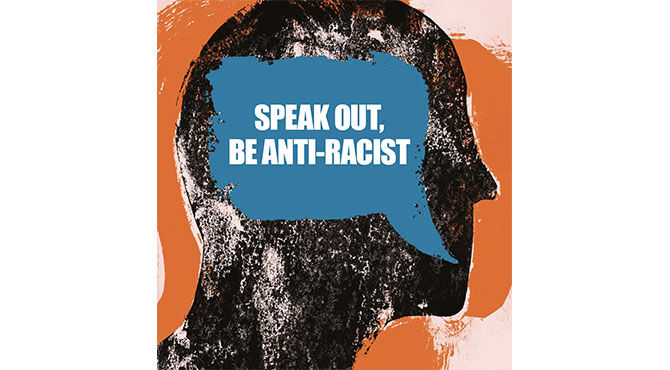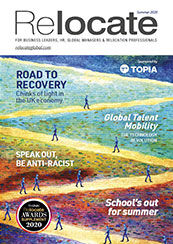Speak out, be anti-racist
We can all bring change in our sphere of influence. Those of us working across global mobility and in international management are in unique position to help lead the way. Fiona Murchie highlights positive steps for individuals and organisations to take to be anti-racist.

 7 July 2020
7 July 2020Click on the cover to access the digital edition or read all of the articles on our website.
“We can all bring change – speak out, be anti-racist,” said Dina Asher-Smith, writing in the Daily Telegraph’s supplement, Women’s Sport Monthly, at the end of June. Reflecting on the killing of George Floyd and the Black Lives Matter Movement, she talked about how the events of the last few weeks have profoundly affected her.“It’s because it affects my life too,’ she explained. “These few weeks have been so hard for so many people for a number of different reasons. For me it was because it brought up so many suppressed memories... There are layers and layers of ‘unconscious’ bias at best, and hate at worst, that affect my life daily.“We are all in a philosophical reflective mood going through this collective traumatic event of coronavirus. The past few months have been illuminating for so many. It’s highlighted how precious and transient life is, exposed shortcomings when it comes to protecting society’s most vulnerable and shown us unequal and ineffective systems.“We know how the power of one action, how one person, has the opportunity to change the world. Please stand up and speak out against racism. Be anti-racist. Equality matters. Black lives matter.”Dina Asher-Smith was just one of many leading black women sportswomen speaking out or highlighted in the Telegraph’s supplement, which reflected on injustices across athletics, football, boxing, cycling and tennis and including homage paid to the ground-breaking achievements of Alice Coachman, the first black woman to win an Olympic gold back in 1948.
John Amaechi highlights a unique role for HR
Taking on board the adage “see it, be it,” this important coverage of sporting achievements, role models and this intersectionality will inevitably inspire girls and women to pursue their dreams and ambitions to reach the top. Its messages also translate strongly into global mobility and the wider world of work.John Amaechi OBE, a former NBA player and now an organisational psychologist and director of the largest NHS trust in the UK, understands how motivation and personal development are the foundation of success that enables people to flourish. An inspiring keynote speaker at the CIPD’s National conference back in 2018, he was invited back to speak at the CIPD’s Festival of Work in June at what was a pivotal moment for the country and indeed the world. It was a privilege to receive his message via Zoom, which he delivered with warmth and wisdom. While John Amaechi’s message was personal to every individual listening, it has particular resonance to the core HR professional audience. I urge CIPD members to listen back.He incorporated race and anti-racism in a relevant and compelling way into his session on Creating a Culture of Self- Directed Learning – critical in these times where we all have to adapt quickly with agility and purpose.Talking about the current situation being “a chance for us all to start over” and create a “cultural clean slate”, John Amaechi spoke ofthe need to prioritise both curiosity and connected leadership. “A basic learning culture is necessary but absent in most organisations,” he said. “Usually everything is a contrivance and an act of compliance. A learning culture is the opposite and about ‘augmented employees’.”Referring to the anti-racist protests in the US and the coronavirus pandemic, John said, “The impact of the last few weeks has been radical. What we have seen is that learning has been essential. We don’t know what we don’t know so we’ve all been tuning in every night to see the news. Learning is the route to safety.”For employers looking to be genuinely more inclusive and learn from their people and customers, and society more widely, as an act of survival he offered four anti-racism quick wins:
An inspiring keynote speaker at the CIPD’s National conference back in 2018, he was invited back to speak at the CIPD’s Festival of Work in June at what was a pivotal moment for the country and indeed the world. It was a privilege to receive his message via Zoom, which he delivered with warmth and wisdom. While John Amaechi’s message was personal to every individual listening, it has particular resonance to the core HR professional audience. I urge CIPD members to listen back.He incorporated race and anti-racism in a relevant and compelling way into his session on Creating a Culture of Self- Directed Learning – critical in these times where we all have to adapt quickly with agility and purpose.Talking about the current situation being “a chance for us all to start over” and create a “cultural clean slate”, John Amaechi spoke ofthe need to prioritise both curiosity and connected leadership. “A basic learning culture is necessary but absent in most organisations,” he said. “Usually everything is a contrivance and an act of compliance. A learning culture is the opposite and about ‘augmented employees’.”Referring to the anti-racist protests in the US and the coronavirus pandemic, John said, “The impact of the last few weeks has been radical. What we have seen is that learning has been essential. We don’t know what we don’t know so we’ve all been tuning in every night to see the news. Learning is the route to safety.”For employers looking to be genuinely more inclusive and learn from their people and customers, and society more widely, as an act of survival he offered four anti-racism quick wins:- Stop being surprised about the extent of racism and unconscious bias
- Don’t ever be tired of talking about it
- Being well-meaning is not enough
- People who are black are not your library: this isn’t about upskilling minorities or being seen to do something.
Inclusive talent management
John Amaechi’s session progresses the inclusion conversation in a positive and relevant way. Stephen Frost is a globally recognised expert in diversity, inclusion and leadership. Many will remember him as Head of Diversity and Inclusion for London 2012 Olympic and Paralympic Games. For organisations and practitioners looking to take a stronger stand on anti- racism practices in the workplace, there is a wealth of information and practical guidance in his two books co-authored with Danny Kalman, Inclusive Talent Management: How business can thrive in an age of diversity and the latest published in 2019, Building an Inclusive Organisation: Leveraging the power of a diverse workforce.They describe how unconscious bias is omnipresent in organisations and likely to be more prevalent at times of stress and change. Not surprising then that at this unprecedented time of change the strides organisations have made in inclusion are already under threat. “First, we have to acknowledge we are biased and then decrease bias in two ways – through conscious leadership (self-awareness) and through unconscious system adjustments (nudges),” they advise. A systematic approach works. Step by step these books will guide you through the process with case studies and plenty of references to research and further reading.Speaking this summer, Stephen Frost reflected, “Around the world, there seems to be a global reckoning with the issue of systemic race is and racial injustice that has persisted for centuries and people are bemused that things haven’t changed.”Writing in an article for Forbes in June he concluded, “If we want 2020 to be the turning point, we need to begin embedding inclusion into all of what we do – from our policies and procedures, to how we use data, to our everyday behaviours. If HR ‘own’ this then as a profession it needs to become more diverse. It needs to build its confidence and sit at the top table, including D&I as a source ofstrategic contribution rather than a mindset of it being an additional burden. It needs to partner with data experts to monitor the progress of inclusion and belonging as well as representation. It needs to influence governance generally and embed D&I in leadership development, system reviews and pay audits. Now is the time.”Supporting organisations to address issues of racial equality and fairness
The CIPD is determined to do more to support organisations put policies in place to help address issues of racial equality and fairness in the workplace. Peter Cheese, CIPD’s chief executive, calls on business to root out prejudice within their organisations.“Racism has no place in our society. Businesses must be part of the change we all need, to step up and stamp out prejudice, and to build diverse and supportive cultures ofrespect and fairness for all. It is important now that leaders across all organisations make time to address current events with their people.”The CIPD outlines four key principles employers can adopt:- Clarify the organisation’s stance and values
- Communicate your messages consistently and ensure that communication is two-way
- Connect your people by talking openly, creating an environment of respect and safety, and to share experiences and learn from each other
- Commit to sustained action, visible leadership and a willingness to change.
Global mobility and international managers' role
The implications of the George Floyd murder are being felt around the world, with racial tensions at a high and peaceful protests disintegrating into violence adding to concerns about the spread of the coronavirus as social distancing disintegrates. For many countries the impending pressures of unemployment, economic uncertainty and political upheaval will inevitably boil over.But now is the time for global mobility professionals and all those working in the sector to seize the moment and show the way and help build more inclusive workplaces. They have expertise and innate cross-cultural awareness, as well as experience of work across borders internationally and responding on a daily basis to emergencies in different parts ofthe world – be it health, compliance, political upheaval, natural disasters or terrorist or cyber attacks.For many working in the sector this is the stuffoflife: the risk analysis you make nearly every day to support the wellbeing of your employees and your organisation. As countries rebuild their economies now is the time to lead by example and share your knowledge, your professional expertise and your capabilities to help find solutions.For advertising enquiries across the Relocate media, call +44 (0)1892 891334, or email ads@relocatemagazine.com.Let us know if you have ideas for features, surveys or events, and keep us informed of your company’s news by emailing editorial@relocatemagazine.com.Subscribe to Relocate Extra, our monthly newsletter, to get all the latest international assignments and global mobility news.Relocate’s new Global Mobility Toolkit provides free information, practical advice and support for HR, global mobility managers and global teams operating overseas.
 Access hundreds of global services and suppliers in our Online Directory
Access hundreds of global services and suppliers in our Online Directory
©2026 Re:locate magazine, published by Profile Locations, Spray Hill, Hastings Road, Lamberhurst, Kent TN3 8JB. All rights reserved. This publication (or any part thereof) may not be reproduced in any form without the prior written permission of Profile Locations. Profile Locations accepts no liability for the accuracy of the contents or any opinions expressed herein.































